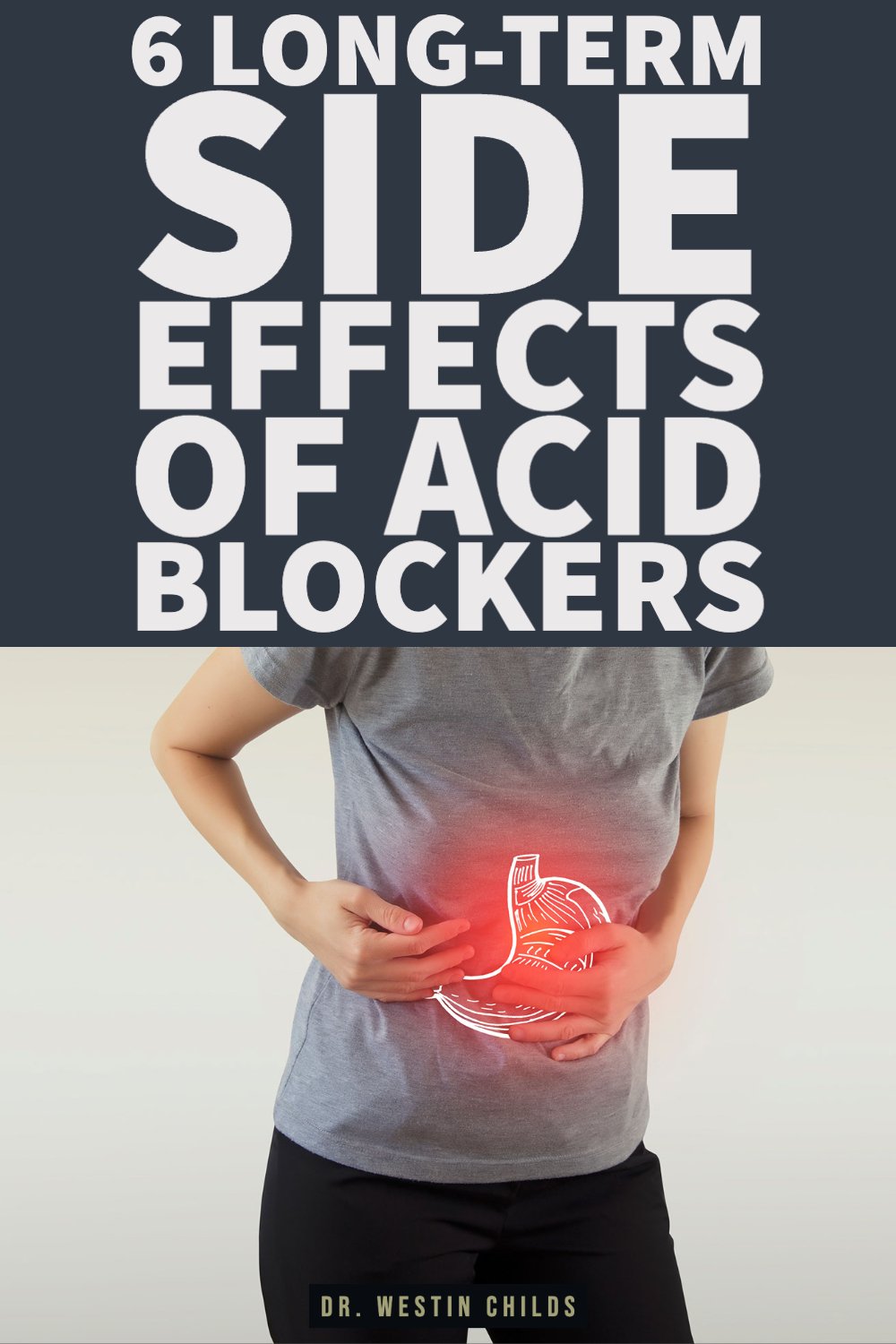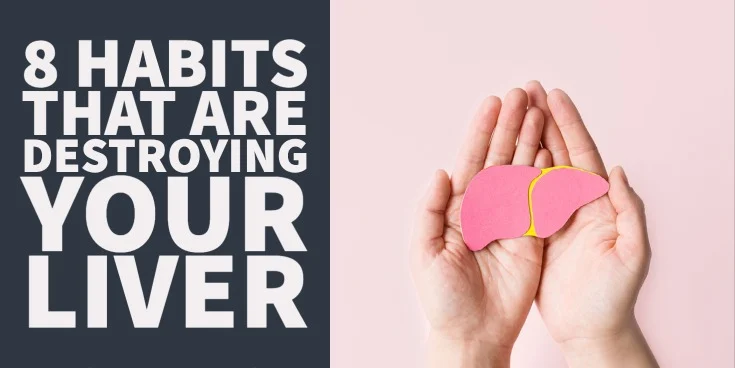By far, one of the worst medications that you could take for your health long term is acid blockers.
Globally, pharmaceutical companies rack in over 13 billion dollars a year from this group of medications and they have some serious potential for long-term complications that most people who take them are unaware of.
When you look at the most commonly prescribed medication list, acid blockers rank near the top!
This means these medications are incredibly popular and frequently prescribed.
Acid blockers work by decreasing how much acid your stomach produces and they are prescribed primarily for heartburn and acid reflux.
But it turns out that your body needs acid to help break down your food and keep your gut bacteria healthy.
Long-term blocking of acid results in a number of complications ranging from cancer risk to nutrient deficiencies and everything in between.
Most patients taking these medications have no idea that they can cause these issues, though, and most are surprised to hear that they were only ever intended for short-term use.
As a result, some patients end up taking these medications for years and years without stopping and put themselves at risk for long-term consequences as a result.
If you are someone who is taking an acid blocker for a condition like acid reflux or heartburn, this is information that you need to be aware of.
Let’s talk about the dangers of long-term acid blocker use starting right now.
DOWNLOAD FREE RESOURCES
Foods to Avoid if you Have Thyroid Problems:
I’ve found that these 10 foods cause the most problems for thyroid patients. Learn which foods you should avoid if you have thyroid disease of any type.
The Complete List of Thyroid Lab tests:
The list includes optimal ranges, normal ranges, and the complete list of tests you need to diagnose and manage thyroid disease correctly!
Danger #1. They Cause Deficiencies in Multiple Nutrients Including Iron, Vitamin B12, Magnesium, and Calcium.
This one is honestly probably the most benign on the list but it’s still a serious complication.
As I said before, it turns out your body needs acid from the stomach to do simple things in the body like break down nutrients and absorb them.
Acid blocker use results in decreased acid production which means that you get less of these nutrients from the food that you eat.
You might think this isn’t a problem because your doctor will just check for these nutrients and tell you when you need to replace them.
But that couldn’t be farther from the truth.
Doctors rarely ever check for these nutrients, even for those who have been on acid blockers long-term and they rarely ever recommend the use of supplements to treat nutrient deficiencies anyways.
This means you’re on your own if you want to take a supplement to replace these low levels.
The good news is that they are relatively easy to replace and if you are someone who has been on an acid blocker long-term,
it’s probably a good idea to just go ahead and take these specific nutrients to prevent future problems.
Ideally, you’d be able to get off of your acid blocker and just get your nutrients from food but that will be very difficult so long as you are blocking acid production.
Danger #2. They Increase Your Risk of Heart Attacks By Up to 16%.
One study from 2015 showed that “consistent with our pre-clinical findings that PPIs may adversely impact vascular function, our data-mining supports the association of PPI exposure with risk for MI in the general population (1)”.
In this context, PPI stands for proton pump inhibitor which is a class of acid blocking medications.
PPI stands for proton pump inhibitor which is a common acid-blocking medication and MI stands for myocardial infarction which is the medical term for heart attack.
Put simply, it seems to be the case that people taking acid blockers have a higher risk of developing a heart attack.
It’s not clear why this association exists, and it very well could be the case that the use of acid blockers is just an incidental finding, but either way, it doesn’t matter.
Here’s why:
Whether or not acid blockers directly result in heart attacks is not the point I’m trying to drive home here.
The need for an acid blocker is just a warning sign that there’s something wrong with your gut and body that should be fixed.
So whether or not the acid blocker is directly responsible for the heart attack or it’s due to other medical conditions that are associated with its use, is irrelevant.
Either way, the problem needs to be addressed and it starts by getting off of the acid blocker.
The need for an acid blocker, in this case, is just a proxy for your overall health.
Taking one means you aren’t as healthy as you could be.
Danger #3. They Increase Your Risk of Developing Food Sensitivities.
Imagine taking a medication that is supposed to “help” your gut, only to find out it’s causing more stomach problems.
And yet, this is exactly what happens to many people who take acid blockers.
It has been documented that long-term use of acid blockers increases your risk of developing not only food allergies but also other allergic diseases like asthma, atopic dermatitis, and allergic rhinitis (2).

The exact mechanism for why this occurs is not really understood, but it probably has to do with the negative impact that these medications have on the gut and the microbiome.
We know that many diseases START in the gut (3), so taking any medication that disrupts your gut may serve as a catalyst for the development of other diseases.
Danger #4. They Can Interfere With The Absorption of Other Medications.
Acid is not only responsible for the breakdown of foods, it’s also responsible for the breakdown of pretty much anything that makes its way into your gut including medications.
Taking acid blockers will reduce how effectively your body digests and absorbs certain medications which means that you may end up taking higher and higher doses.
And higher doses mean that you are putting yourself at risk for more side effects.
This is especially true for people who take thyroid medications like levothyroxine and Synthroid.
Acid blockers significantly reduce the absorption of thyroid medications which means it’s harder for these patients to regulate their thyroid.
This means more symptoms like fatigue, weight gain, hair loss, and more.
Danger #5. They Increase Your Risk of Developing Clostridium Difficile Colitis and Other Infections.
Clostridium difficile is a pathogenic bacteria that lives in your gut and causes a really intense and unwanted form of diarrhea.
It’s often very hard to treat, and most people who get this diarrhea infection end up with multiple bouts.
The connection between acid blockers and gut infections has to do with the impact that long-term acid suppression has on the gut microbiome.
Acid is necessary for the breakdown of food which is used to feed healthy bacteria in the gut.
If you are unable to break down food products to provide food for the good bacteria in your gut, you’ll end up with an overgrowth of bad bacteria and an undergrowth of good bacteria (4).
This is also why taking them increases your risk of developing overgrowth syndromes like small intestinal bacterial overgrowth and small intestinal fungal overgrowth.
These overgrowth syndromes are incredibly hard to treat and lead to many quality-of-life symptoms like
chronic constipation, chronic diarrhea, gas, bloating, and abdominal pain.
Danger #6. They Increase Your Risk of Developing Osteoporosis.
Because acid blockers reduce the absorption of calcium, it should come as no surprise that they also negatively impact your bones.
The decrease in bone density that can come from long-term acid blocker use also increases your risk of fractures as well.
This negative consequence is seen in both men and women and tends to get more serious the older you get.
Fractures, especially of the hip, can lead to serious long-term consequences (5) and should be avoided at all costs.
Danger #7. They May Increase Your Risk of Developing Gastric Cancer.
This is where things really start to get interesting because acid blockers are often prescribed with the goal to try and PREVENT esophageal cancer.
And yet at least one meta-analysis of 11 other studies shows that the use of acid blockers for 5 years is associated with an increased risk of stomach cancer (6).
So it may be the case that using these medications replaces your risk of throat cancer for that of stomach cancer.
Neither is ideal, obviously, which is why your goal should be to stop taking your acid blocker as soon as possible.
Your Next Steps
The need for an acid blocker stems from the idea that your gut is producing too much stomach acid.
But what if you could fix that problem, normalize your acid production, and heal your gut in the process?
If you could do that, you’d have no need for this medication.
And that’s exactly what I would recommend that you try to do.
The only problem is that taking an acid blocker long-term can create a sort of dependence and when you stop them, you may experience something called rebound acid hypersecretion.
This can lead people to believe that they NEED acid blockers when in reality, their body is just adjusting to the lack of medication.
If you want to get started on healing your gut so you can avoid all of these negative consequences, I would recommend checking out this article next.
Ultimately, you will need to take a lot of steps to heal your gut but this is a great starting point.
Now I want to hear from you:
Are you taking acid blockers?
Were you aware of their negative consequences?
Are you planning to try and get off of yours? If so, what steps are you taking?
Leave your questions or comments below!
Scientific References
#1. ncbi.nlm.nih.gov/pmc/articles/PMC4462578/
#2. ncbi.nlm.nih.gov/pmc/articles/PMC6332498/
#3. ncbi.nlm.nih.gov/pmc/articles/PMC4566439/
#4. gut.bmj.com/content/65/5/740
#5. ncbi.nlm.nih.gov/pmc/articles/PMC3090435/
#6. pubmed.ncbi.nlm.nih.gov/29852782/









